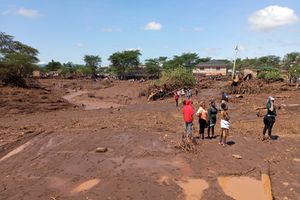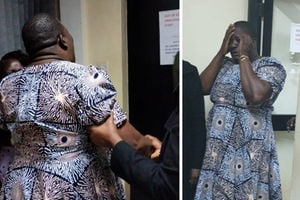DR Congo's Tshisekedi: Son, heir and presidential candidate

Leader of the Democratic Republic of Congo's political party Union for Democracy and Social Progress Felix Tshisekedi on September 12, 2018. PHOTO | JOHN THYS | AFP
KINSHASA
Felix Tshisekedi, opposition candidate for next month's crucial presidential elections in DR Congo, goes into the contest with political heft as the son of Etienne Tshisekedi, his party's late founder.
Tshisekedi senior, founder of the Union for Democracy and Social Progress (UDPS), died in February last year and his heir now hopes to make the great leap from opposition to the presidency.
The portly "Fatshi", as his friends call him, hopes to succeed President Joseph Kabila, who has ruled the volatile, poverty-stricken nation with an iron fist since 2001.
But it briefly didn't look like Tshishekedi, 55, would even to be on the ballot.
On November 11, he and his running mate Vital Kamerhe joined five other opposition figures in choosing unheralded deputy Martin Fayulu as a unity candidate to face Kabila's handpicked successor, Emmanuel Ramazani Shadary.
That deal lasted just 24 hours as Tshisekedi and Kamerhe succumbed to grassroots party pressure and ditched Fayulu to announce they would stand on a joint ticket, dividing the opposition camp.
If they win, Tshisekedi would become president and Kamerhe, a former National Assembly president who ran against Kabila in 2011 and leads the Union for the Congolese Nation (UNC), would be prime minister.
Since Tshisekedi senior founded the UDPS in 1982, the party has served as an opposition mainstay in the former Belgian colony -- first under dictator Mobutu Sese Seko then Kabila's father Laurent-Desire Kabila, who ruled from 1997 until his death in 2001.
Yet the ditching of the pact with Fayulu has made ripples, if not waves, weakening the opposition and leaving it in some disarray.
Father of five Tshisekedi and Fayulu attend the same Pentecostal church in the capital Kinshasa but will now both be vying to see off Shadary, a Catholic, at the polls.
Tshisekedi includes among his credentials a Belgian-obtained diploma in marketing and communication -- but detractors suggest the qualification is not valid.
His opponents also point to his never having held high office or having managerial experience.
But he has risen through the party ranks -- in 2008 he became national secretary for external relations and last March was elected party head after his father's death.
He was elected to the national assembly in 2011, representing Mbuji-Mayi in the Kasai-Oriental province, but he did not take his seat as he did not recognise his father's 2011 election defeat to Kabila.
Tshisekedi, who does not enjoy the same degree of popularity as his father, last year said that if he won the presidency he would set up a "truth and reconciliation commission" to call Kabila to account, but would allow him to stay in the country.





